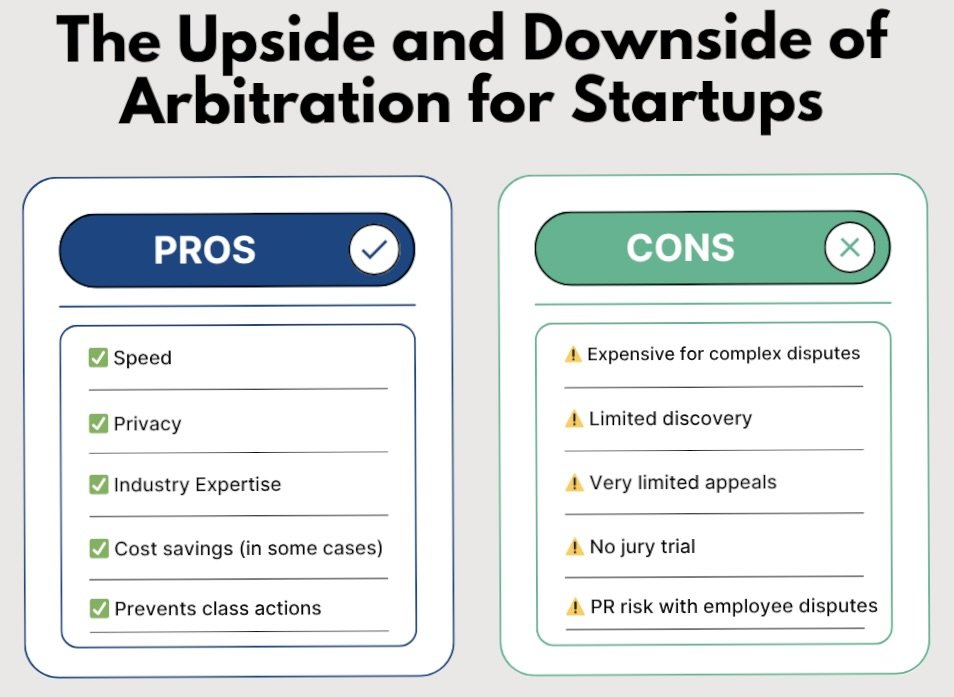Arbitration Provisions in Company Contracts: Pros and Cons
I can't count how many founders I've watched go pale when they realize the litigation they're facing will cost six figures before they even get to trial. Founders will spend over tens of thousands in legal fees, and the case hasn’t even gone to trial yet. When I ask if they have an arbitration provision in their employment agreements, there is often a long pause followed by, "What's that?"
Arbitration provisions are like emergency exits in a building – nobody pays attention to them until there's a fire, and then suddenly they're the most important feature in the room.
What Is An Arbitration Provision?
An arbitration provision is essentially an agreement that if things go sideways between the parties, they'll resolve their dispute through arbitration rather than litigation in court.
Think of it as agreeing to settle your disputes with a neutral third party in a private conference room instead of airing your dirty laundry in the public theater of a courtroom.
The Airbnb Lesson: When Arbitration Saved Millions
In 2016, Airbnb faced a potential class-action nightmare when users tried to sue the company over alleged racial discrimination by hosts. Thanks to the mandatory arbitration clause in their Terms of Service, Airbnb successfully redirected these complaints to individual arbitration proceedings rather than facing a massive class action lawsuit (Selden v. Airbnb, Inc.).
The difference? Potentially millions in legal fees and damages versus handling disputes individually in a private setting. For a company that was still scaling rapidly, this was the difference between a PR headache and a potential existential threat.
How Arbitration Saved Airbnb Millions
Why Should Founders Care?
The Good Stuff
Speed: Court proceedings move at a sloth-like pace. Arbitration proceedings can be completed in months rather than the years it takes for litigation.
Privacy: Unlike court proceedings, which are public, arbitration keeps your business disputes behind closed doors. No reporters, no competitors taking notes, no embarrassing depositions showing up on TechCrunch.
Cost (Sometimes): For simple disputes, arbitration can be less expensive than litigation. Think thousands versus tens (or hundreds) of thousands.
Class Action Prevention: Including a class action waiver with your arbitration provision can prevent disgruntled employees or customers from banding together to form the legal equivalent of a pitchfork-wielding mob.
Expertise: You can choose arbitrators with expertise in your industry who won't need a three-hour tutorial on what an API is or why your SaaS metrics matter.
The Not-So-Good Stuff
Cost (For Complex Cases): For complex disputes, arbitration can actually be MORE expensive than litigation. Arbitrators charge $400-$1,200 per hour, and you're paying for their time, the venue, and all administrative costs.
Limited Discovery: Less access to the other side's documents and witnesses may hurt your case if you need that information to prove your claims.
Limited Appeals: Arbitration decisions are typically final with very limited grounds for appeal. If the arbitrator gets it wrong, you're usually stuck with the result.
Loss of Jury Trial: Sometimes having sympathetic humans deciding your case is advantageous. With arbitration, you're giving that up.
Employee Relations: Mandatory arbitration provisions in employment contracts are increasingly viewed negatively, and some states (looking at you, California) have even restricted their use.
The Upside and Downside of Arbitration for Startups
When Should Your Startup Use Arbitration Provisions?
Consider including arbitration provisions in contracts with:
Customers: Especially if you serve consumers who might bring class actions
Vendors: Particularly when trade secrets might be involved -
Co-founders: Yes, your business marriage needs a prenup too
Employees: But tread carefully and consider the PR implications.
How To Actually Draft These Things
The worst arbitration provision is the one you copy-pasted from Google without understanding it. Here's what your provision should cover:
Scope: What disputes are covered?
Rules: Which arbitration organization's rules will apply? (AAA, JAMS, etc.)
Selection: How will the arbitrator(s) be selected?
Location: Where will the arbitration take place?
Costs: Who pays for what?
Class Action Waiver: Are class actions prohibited?
Confidentiality: Is the proceeding confidential?
Carve-Outs: Are any disputes excluded from arbitration? (IP claims often are)
Final Thoughts: To Arbitrate or Not to Arbitrate?
Like most legal decisions, there's no one-size-fits-all answer. But here's a rule of thumb: if you're the type of business that could face a class action lawsuit, if maintaining privacy around disputes is critical, or if litigation has the chance of hindering growth, arbitration provisions probably belong in your contracts.
For early-stage startups, mandatory arbitration can be the difference between an annoying distraction and a company-killing lawsuit. Just remember, the time to think about dispute resolution is when everyone still likes each other – not when you're already facing a lawsuit.
And, as always, this post isn't legal advice. It's just one lawyer's attempt to make complex legal concepts slightly more digestible.
Got questions about arbitration provisions or other startup legal issues? Drop them in the comments below or give us a call.


